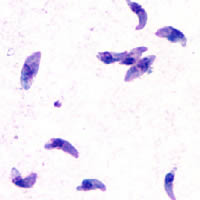
Photo from wikipedia
Background: Toxoplasma gondii is an apicomplexan parasite with zoonotic importance worldwide especially in pregnant women and immunocompromised people. This study is set to review the literature on T. gondii infections… Click to show full abstract
Background: Toxoplasma gondii is an apicomplexan parasite with zoonotic importance worldwide especially in pregnant women and immunocompromised people. This study is set to review the literature on T. gondii infections in humans and animals in southern Africa. Methods: We extracted data regarding T. gondii infections from published articles from southern Africa from 1955 to 2020 from four databases, namely Google Scholar, PubMed, EBSCO Host, and Science Direct. Forty articles from eight southern African countries were found eligible for the study. Results: This review revealed a paucity of information on T. gondii infection in southern African countries, with an overall prevalence of 17% (95% CI: 7–29%). Domestic felids had a prevalence of 29% (95% CI: 7–54%), wild felids 79% (95% CI: 60–94), canids (domestic and wild) 69% (95% CI: 38–96%), cattle 20% (95% CI: 5–39%), pigs 13% (95% CI: 1–29%), small ruminants (goats and sheep) 11% (95% CI: 0–31%), chicken and birds 22% (95% CI: 0–84%), and humans 14% (95% CI: 5–25%). Enzyme-linked immunosorbent assay (ELISA) and immunofluorescence antibody test (IFAT) constituted the most frequently used diagnostic tests for T. gondii. Conclusions: We recommend more focused studies be conducted on the epidemiology of T. gondii in the environment, food animals and human population, most especially the at-risk populations.
Journal Title: Pathogens
Year Published: 2022
Link to full text (if available)
Share on Social Media: Sign Up to like & get
recommendations!